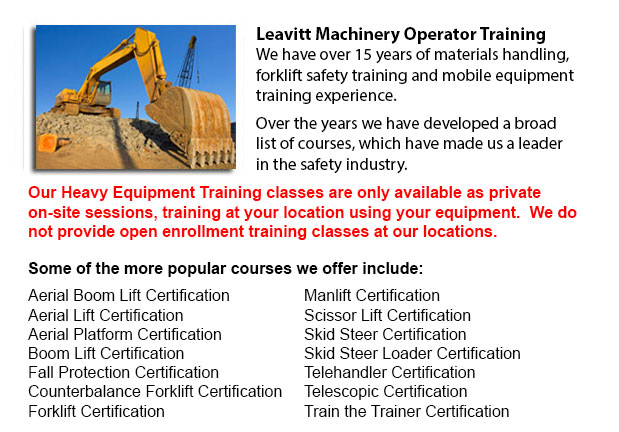
Heavy Equipment Operator Certification Ontario - The individual who manipulates the controls and drives various kinds of heavy machinery is called a heavy equipment operator. Most frequently, this machine is utilized on construction sites to lift and deliver heavy supplies and to be able to move earth and carry out construction jobs. Heavy industrial machinery can comprise backhoes, cranes, bulldozers and excavators. The operator should adhere to safety measures since he maneuvers the machinery to complete his job. He can be the sole equipment operator as part of the team or on the jobsite.
A heavy equipment operator would make use of various construction machinery, depending upon the nature of the job at hand. The huge machinery are constructed to carry out particular tasks in the most efficient method for each and every business. Various types of machinery are small enough to be used in plants or inside of warehouses, and could be specifically designed to move pallets and boxes. Larger machine is normally used outdoors to clear areas and grade land in preparation for construction.
There are numerous projects that require the skill of a heavy equipment operator, like for instance public works projects and endeavors of privately owned companies. Tasked completed by public works offices may include construction of roads and the construction of bridges. There are many other publicly financed projects which consist of airport runways, dam construction, levees, power plants and municipal structures. Private projects can comprise the construction of malls, office buildings, industrial parks and retail stores.
Small scale tasks will normally require heavy machinery to be used in large industrial spaces or within commercial buildings. The equipment which would be utilized in this particular instance, consists of forklifts, cherry pickers and pallet jacks. Backhoes and trenchers are usually available in different sizes appropriate for tasks needing less bulky and powerful machines.
Operators of heavy equipment will be needed to be certified by their regional or local agency. Many of these operators are cross-trained and certified to operate many different models of heavy equipment. Other operators choose to specialize in operating just one kind of equipment and only need periodic updates on their operating permit certifications.
Workers in this industry are often trained through a formal apprenticeship course provided by companies or unions or else with on-the-job training. Some technical and trade schools provide paid training courses. It is necessary that employers hire fully-trained heavy equipment operators in order to follow local rules and follow local and regional laws regarding employee safety and job situations.
-
Scissor Lift Ticket Ontario
Scissor Lift Ticket Ontario - Scissor lifts have greatly benefited construction operations for the reason that the work that used to need a great deal of effort and many individuals, could now be accomplished utilizing the scissor lift truck and only... More -
Crane Training Ontario
Crane Training Ontario - Overhead cranes are likewise called bridge cranes. They are a kind of crane that consists of a hook and line apparatus that runs along a horizontal beam that runs along two widely separated rails. A lot of overhead cranes can... More -
Forklift Training Schools Ontario
Forklift Training Schools Ontario - The Benefits Of Taking One Of Our Forklift Training Schools If you are looking for work as an operator of a forklift, our regulatory-compliant forklift training Schools offer excellent instruction in various typ... More -
Heavy Equipment Safety Training Ontario
Heavy Equipment Safety Training Ontario - A very essential topic for individuals who work in industry environments is heavy equipment safety. This particular subject is relevant for those likewise who employ the use of heavy equipment to be able to c... More -
Bucket Truck Training Ontario
Bucket Truck Training Ontario - The bucket truck training program is a program that is intended to effectively train qualified operators so they can decrease the risk of incident and personal injury while working with or in close proximity to bucket... More -
Heavy Equipment Training Ontario
Heavy Equipment Training Ontario - Usually, the different types of heavy equipment training are divided into 2 categories of machines: those that have rubber tires and tracked vehicles. Tracked vehicles comprise items like for instance bulldozers, ex... More -
Scissor Lift Certification Ontario
Scissor Lift Certification Ontario - Scissor lift platforms are made use of at work places to be able to enable tradespeople - such as welders, masons and iron workers - to reach their work. Utilizing a scissor lift platform is normally secondary to... More -
Fall Protection Training in Ontario
Sadly, there are many workplace injuries associated to falling and a lot of fall-related deaths reported each year. Many of these instances could have been avoided by having right precautions in place, offering proper training and equipping staff pro... More

Forklift Training Ontario
TOLL FREE: 1-888-254-6157
Toronto, Ontario
forklifttrainingontario.com
Email Us
About Us



